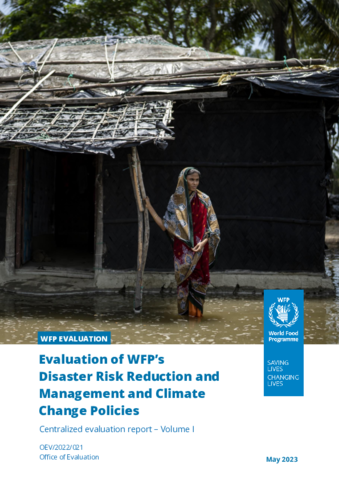
This evaluation covers both the 2011 policy on disaster risk reduction and management (DRRM) and the 2017 climate change policy, given their conceptual, programmatic and organizational links.
The evaluation assessed the quality and results of both policies, along with the factors that enabled and hindered those results. It covered the period since the policies were approved, with a focus on 2017–2022.
The evaluation concluded that:
- Both policies are no longer aligned with the latest developments in international frameworks and agreements.
- A WFP conceptual framework that encompasses DRRM, resilience and climate action would enable WFP to engage all relevant stakeholders with common, interdependent goals across the humanitarian, development and peace nexus.
- Areas of intervention prioritized in both policies feature prominently in the programmatic portfolio of WFP but the influence of the DRRM and climate change policies on these areas varies greatly. The areas that are uniquely prioritized in the climate change policy have experienced significant growth since the policy was approved, with substantial resources secured from climate change funding streams.
- DRRM and climate change interventions appear to be increasingly effective but monitoring, evaluation and reporting systems have not been sufficiently robust to support institutional learning. As climate-related work evolves from a programmatic area to a cross-cutting issue, monitoring, evaluation and knowledge management will need to evolve accordingly.
- While both policies seek to achieve sustainable results, limited guidance was provided on how to develop and implement contextualized sustainability strategies.
- Gender-transformative results are still rare, or rarely captured, and there is still progress to be made on Intersectionality in DRRM and climate change.
- Successful resource mobilization through climate change funding streams partly mitigated the inadequate allocation of resources to support the policies’ implementation. However, headquarters and regional bureaux face challenges in keeping pace with country office demand.
- Partnerships on DRRM and climate change vary greatly in terms of purpose, expectations and results. Close partnerships with governments are emerging as essential for effectiveness but are challenging to sustain. Other country-level partnerships increasingly include private sector actors. Globally, WFP proactively partnered with the Rome-based agencies and other United Nations entities, but with mixed results. Partnerships require specific skills and sufficient time and planning to be inclusive.
